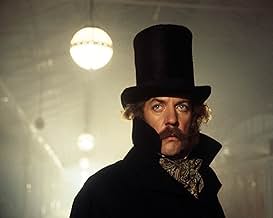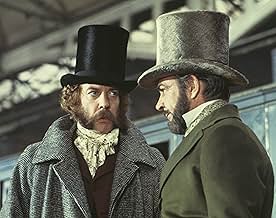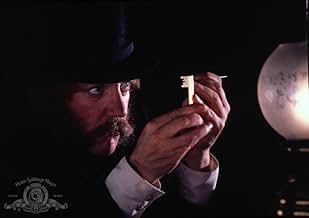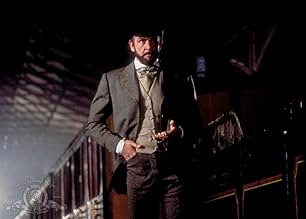Inglaterra, 1850. Um mestre criminoso tem como objetivo roubar um trem de uma grande soma de ouro. A segurança é incrivelmente rigorosa e a tarefa parece impossível. No entanto, ele tem um p... Ler tudoInglaterra, 1850. Um mestre criminoso tem como objetivo roubar um trem de uma grande soma de ouro. A segurança é incrivelmente rigorosa e a tarefa parece impossível. No entanto, ele tem um plano e as pessoas certas para realizá-lo.Inglaterra, 1850. Um mestre criminoso tem como objetivo roubar um trem de uma grande soma de ouro. A segurança é incrivelmente rigorosa e a tarefa parece impossível. No entanto, ele tem um plano e as pessoas certas para realizá-lo.
- Direção
- Roteirista
- Artistas
- Prêmios
- 1 vitória e 1 indicação no total
- John - Trent's Butler
- (as Brian De Salvo)
- Judge
- (as Andre Morell)
Avaliações em destaque
'The First Great Train Robbery' is about the fastest pickpocket you'll ever see, a suave and daring gentleman who never tells the truth It is also about a bunch crooks that can steal your heart with the company of a fascinating disguised mistress who suspects that her father breaks his own regulation for each morning of the shipments...
'The First Great Train Robbery' chronicles the grandeur and hypocrisy at all levels of England during the Victorian Era, and proves that the cleverness and prowess of a criminal mastermind is elevated to heroic status...
With excellent photography of Ireland beautiful countryside, and great music score by Jerry Goldsmith, plus the costumes and sets, Michael Crichton's movie gives train heist's fans the pleasure to enjoy a very entertaining period thriller
This was a superb heist movie. It was clever, it was cohesive, and it was funny. I liked the pairing of Connery and Donald Sutherland. Heist movies always have to be clever and cutting edge because the mark is always super-secure and nearly impossible to breach. What sets one heist movie apart from the other is the story within and the characters. This story was straight forward and simple. There were no red herrings, no sappy side stories, and no deux ex-machinas. And the characters were very enjoyable.
This Michael Crichton film was simply excellent.
Based on a true incident , this intrigue-filled caper has been packed with suspense , thrills , action , stylish fun and hooks to keep interested . The film was entitled "The First Great Train Robbery" to distance it from a £2 million robbery from a mail train in 1963 which was known in the British press as "The Great Train Robbery" . The movie faithfully reflects some events of the Victorian era such as large differences of classes , public executions applauded by the assistants , carriage parades and many other things . Sensational trio protagonist who can steal your heart , as Sean Connery as a dashing mastermind , Donald Sutherland as a skill cracksman , and a gorgeous Lesly-Anne Down . Agreeable support cast such as Robert Lang , Michael Elphick , Alan Webb and Wayne Sleep ,one of Britain's premier ballet dancers, from The Royal Ballet Company , he actually did his own stunts, including scaling the Newgate prison walls, at the tremendous risk of falling and hurting himself . And it was the final film for both André Morell and Peter Butterworth, both of whom had died by the time that it was released . Thrilling and intriguing musical score by the great Jerry Goldsmith , director Michael Crichton frequently hired Jerry Goldsmith to compose the scores for his films . Colorful and evocative cinematography by Geoffrey Unsworth , in fact , the picture is dedicated to his memory ; being marvelously photographed against gorgeous Irish countryside . The motion picture was well directed by Michael Crichton . After giving up medicine, Michael moved to Hollywood, California, in the early 1970s and began directing movies based on his books, his first big break being ¨Westworld¨ (1973) and subsequently wrote and directed other successes as ¨Coma¨, ¨Runaway¨ and ¨13º warrior¨ until his early death by cancer at 66 years old .
The inimitable Donald Sutherland, playing a Victorian pickpocket and con man, is somewhat miscast as Connery's partner. He is not convincingly English, to my surprise frankly, though he does bring a new characteristic or two to virtually each film he's in, and here he's not just Connery's cohort but his foil. Leslie Ann Down plays Connery's moll and co-conspirator, and she appears to have been preordained to wear Victorian undergarments.
The plot for the heist is rather upfront: The train's safe, containing the gold, is protected with four keys, each in different hands. The challenge is to divide these holders from their keys, if possible in scenarios that serious, by-the-book Victorian gentlemen would be opposed to explaining to the police, so one aged banker is shadowed at a dogfight and another is intercepted in a brothel. There's also a Stopwatch Sequence for caper enthusiasts like me: Connery and Sutherland undergo numerous trials before endeavoring to burglarize the railway company office, and we get a gracefully stage-managed robbery effort with all the timeless taps like the guard reappearing a nanosecond after the critical moment and such.
One of the foremost amusements of this drum-tight caper is the way it's determinedly in the Victorian era. The costumes and the art direction are sincere, Crichton infuses his dialogue with undoubtedly genuine Victorian gangland wording, and, for the climactic train heist, they even constructed a whole operational train. Other gratifications: The nefarious deception used to smuggle Connery into the protected car with the gold; the chase sequence atop the train; and, certainly, the loin-scorchingly superb presence of Down, who is wryly funny in her own right.
An ornately thorough and exciting caper that parades historical accuracy in support of the tempting charisma of gentleman scoundrels up to no good. Connery and Sutherland are unscrupulous to their foundations but full of audacity and shrewdness. We're supportive of them all the way, with their dashing top hats, rustling coat-tails and panorama of facial hair.
There's a patent two-act structure to the proficient script. Crichton has a scientist's sensitivity to exactitude. First the crack team toil through the preparation phases, as they progressively appropriate indentations of the four keys necessary to unlock the safe, resulting in the heist itself on a train tearing through the British scenery. In the course of this era of steam power, it appeared a hopeless scheme. Meek, perhaps, by the wicked tempo of modern action sequences, Crichton nevertheless infuses a rousing realism with Connery mannishly performing his own stunts as he traverses the rooftop through clouds of grimy smoke, for the golden fleece.
All around, Crichton absorbs the tissue and texture of whimsical Victoriana from the bitter brick walls of the prison for Wayne Sleep's lithe prison escape to the plush, glossy furnishings of the brothel where the sexy Down slips a key from Alan Webb's frenziedly horny bank manager. But naturalism is not the approach, Crichton is after a giddy attribute like it's being told as a tall story in a pub sopping in overstatement and heightened deceit to whitewash impractical snags.
A delightful period caper picture that's high on production value and fun characterisations. Split into two halves, Crichton's movie makes light of the actual crime to portray Connery and co as lovable rogues, thus hooking the viewer in to actually root for them to pull off the intricate crime. First half (well it's more two thirds of the film to be exact) details how the robbers obtained the four keys needed to get into the safe. Harder than it sounds since they are in different locations to one and other and guarded over by different officials. Naturally there are scrapes, skirmishes and obstacles to overcome during this complex operation, and no short amount of humour and tension either. Then it's on to the actual crime, which buzzes ferociously with derring do and ingenious cheek! It may have been loaded with chitter chatter and much bluffing of the way leading up to it, but the pay off is excellent and not without genuine excitement as Connery's (doing his own stunt work) Pierce and Sutherland's safe cracking Agar pull off the seemingly impossible.
Benefiting the film greatly is Crichton's attention to detail, where he thrives on the Victorian England setting. From the streets, the costumes, the dialogue and mannerisms of the characters, they all fit nicely within the narrative. Helps, too, that the cast are playing it with tongue in cheek, Connery and Sutherland are revelling in playing roguish dandies, splendidly attired facially with quality face fuzz and Down raises the temperature of Connery and male audience members alike. Probably her best ever performance, Crichton writes a good role for Down that sees her not only as a sexy head turner (it's unlikely that Victorian underwear has ever looked this sexy before in film), but also as an observant member of the gang; one who isn't too shabby on the disguise front either. Dancer Wayne Sleep is nicely cast as a fleet footed housebreaker, while Lang, Webb, Morell and Michael Elphick pitch their respective performances just right. Goldsmith's score is energetic and Unsworth's (his last film as he sadly passed away shortly after shooting it) photography is a lesson in quality without trickery.
Fanciful and tame if compared to the big budgeted actioners of today, The First Great Train Robbery none the less is testament that simplicity of plot and a keenness to entertain is sometimes all you need. 8/10
Você sabia?
- CuriosidadesWriter and director Michael Crichton based his book and movie, only loosely on the actual crime committed in 1855. In real-life, there were four criminals: Pierce, Agar, the railway guard Burgess, and a railway clerk named Tester. All four keys were kept on railway premises, two in London, and two in Folkestone. They were stolen temporarily by Tester and Pierce, respectively, so that Agar could duplicate them, but it turned out that the Folkestone keys were not being used anyway. The guard's van was not locked from the outside; Pierce and Agar were let in by Burgess, and a share of the loot was handed out to Tester, at stations. None of the criminals were spotted at once; it was several months before the railway conceded that the crime must have occurred on the train. The details came to light after Agar had been convicted in an unrelated crime, and his accomplices decided to steal his share instead of using it, as he had asked, to provide his mistress an income. She got word to him, and he turned Queen's Evidence against the others, and told all. At no point in the case, did anyone escape from custody.
- Erros de gravaçãoIf the gold shipment was solely to pay British soldiers in Crimea, as asserted, it would have been in the form of barrels of gold coins, not gold bars as shown.
- Citações
Judge: [Judgementally] Now, on the matter of motive, we ask you: Why did you conceive, plan and execute this dastardly and scandalous crime?
Edward Pierce: I wanted the money.
[the court spectators roar with laughter]
- Cenas durante ou pós-créditosCóras Iompair Éireann is misspelled in the end titles with an accent over the 'C' instead of the 'o'.
- Versões alternativasUnder the terms of the Cinematograph Films (Animals) Act 1937 all UK versions of the film are cut by 32 secs with edits to a scene where a dog hunts and kills rats in a show arena ('ratting').
- Trilhas sonorasI Dreamt I Dwelt in Marble Halls
(uncredited)
Music by Michael William Balfe
Lyrics by Alfred Bunn (1843)
Heard on violin offstage in bordello
Principais escolhas
Everything New on Prime Video in July
Everything New on Prime Video in July
Detalhes
- Data de lançamento
- País de origem
- Idiomas
- Também conhecido como
- El gran asalto al tren
- Locações de filme
- Cork Kent station, Glanmire Road, Cork, County Cork, Irlanda(Brighton station)
- Empresas de produção
- Consulte mais créditos da empresa na IMDbPro
Bilheteria
- Orçamento
- US$ 6.000.000 (estimativa)
- Faturamento bruto nos EUA e Canadá
- US$ 13.027.857
- Fim de semana de estreia nos EUA e Canadá
- US$ 391.942
- 4 de fev. de 1979
- Faturamento bruto mundial
- US$ 13.027.857
- Tempo de duração1 hora 50 minutos
- Cor
- Proporção
- 1.85 : 1
Contribua para esta página
























